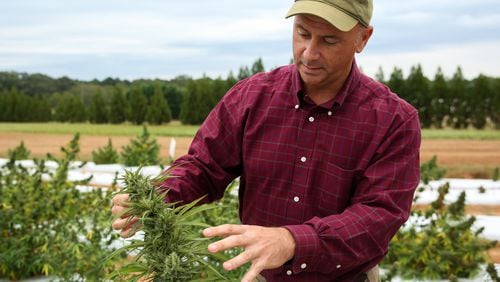Hemp farming can’t start in Georgia unless the state government spends hundreds of thousands of dollars to oversee the crop.
Georgia Agriculture Commissioner Gary Black said Tuesday that he will ask state lawmakers for $800,000 for each of the next two years to create a state hemp program, a requirement of the U.S. Department of Agriculture before the state's hemp regulations can be approved.
The request for $1.6 million in new funding comes as the General Assembly must cut the state's budget this year as tax collections have slowed. No money was appropriated for hemp farming when Georgia lawmakers voted to allow it last year.
Hemp comes from the cannabis plant and is used to make CBD oil, a popular product imported from other states and sold in Georgia health stores. Hemp contains less than 0.3% THC, the compound that gives marijuana users a high.
If funding is approved by early March, farmers could plant their first hemp crops soon afterward, in time for this year's growing season, Black said. He said Georgia has the potential for a significant hemp farming industry that rivals other states.
“If we’re going to be No. 1, we have to put resources where they’re needed,” Black said. “It’s going to require theses strategic investments. I don’t think it’s unreasonable for USDA to require that.”
State funding would pay for two field inspectors, two administrators, an enforcement officer, four four-wheel-drive vehicles, training and computers, according to Black’s budget request.
“I know this is important to our members but more important to Georgians as a whole,” House Appropriations Chairman Terry England said. “While it is a lot of money, we will be working with Commissioner Black, the Senate and the governor to see what we can do to resolve the issue in a timely manner.”
Federal law requires the Georgia Department of Agriculture to certify that it has the resources and personnel necessary to carry out a hemp farming program. The state can’t provide that certification unless it funds a hemp farming program, Black said.
The U.S. Department of Agriculture has already reviewed Georgia's proposed hemp plan and could approve it within days of the General Assembly appropriating money, Black said. The hemp rules would require farmers to pay an annual fee, submit to inspections and keep accurate harvest records.
“We are threading a bit of a needle, but it’s very doable” for hemp farming to begin this spring and summer, Black said. “I’d rather be deliberate and intentional and then ready to act.”
About the Author








